Related Content
Content
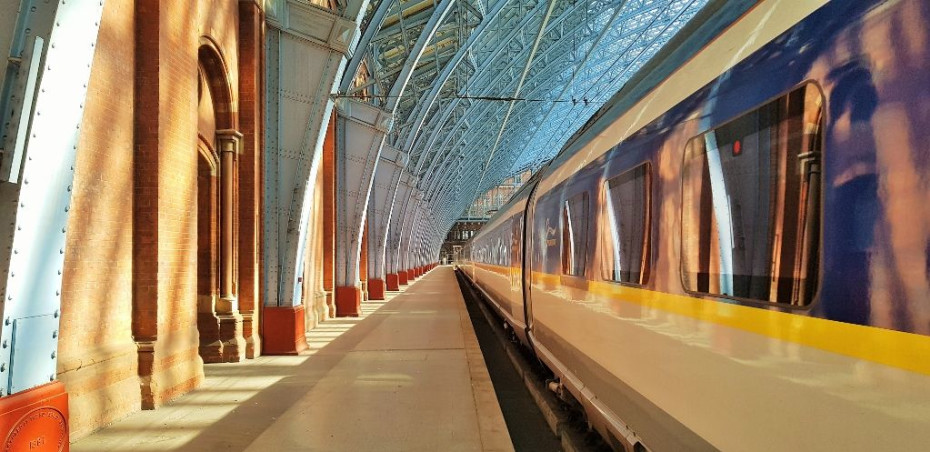
London to Europe by train
An overview of how to travel by train from London to Austria, Belgium, Czechia, Denmark, France, Germany, Italy, Poland, Spain and Switzerland
Share
Travelling from London to popular destinations in Europe by train is obviously a great idea, particularly when destinations can be reached in a single day, or over the course of one night.
However, most of these train journeys from London to Europe, which can be completed in 24 hours, require connections between trains.
This can can lead to a multitude of journey options being offered by the ticket agents.
Which is just one confusing aspect of making these longer train journeys, as they're often more complicated than they should be; Better timed connections in Bruxelles and Lille are near the top of SMTJ's wish list.
Hence some context to enable would be travellers to understand these journey options; Keeping things simple has been the aim, though it may not look that way.
Or you can take a look at the Concierge rail travel planning service, as it can help you with travelling by train from London to any of the destinations on this guide; and beyond.
Four key pieces of information:
As can be seen below, only five destinations are served by regular direct Eurostar trains from London, so travelling to other destinations in Belgium, France and The Netherlands, or to anywhere in Austria, Czechia, Denmark, Germany, Italy, Poland, Spain and Switzerland, requires connections.
And these connections between trains often aren't as simple as they could be, so there can be minor obstacles to overcome and some situations best avoided; Hence the efforts to explain how you can take the train to Europe and make your journey as stress-free as possible.
It can be a wonderful way to travel, but four London to Europe train journey issues which can’t be avoided are:
(1) In Paris the Eurostar trains arrive at the Gare Du Nord, but trains to destinations to the east, south and west of the French capital depart from other stations in Paris.
(2) At Lille-Europe station timetable planners evidently put little thought into the timings between the arrival of a Eurostar from London and the departure of a TGV on to other cities in France.
Often the interval between trains is too long for the ticket agents to consider offering these ‘connections’ as an end-to-end journey option.
(3) At Bruxelles-Midi station, the typical time to make the transfer between an arriving Eurostar and the ‘connecting’ ICE train on to Germany, is only around 20 mins.
Perfect IF the Eurostar arrives on time, but a potential issue when it doesn’t.
(4) A welcome recent development is the restoration of overnight trains from both Bruxelles to both Berlin and Wien/Vienna, but the number of overnight connections from Eurostar services is still fairly limited.
The overnight trains from Koln/Cologne to Prague and Warsaw were discontinued some years ago, along with the overnight trains from Paris to a swathe of destinations including Barcelona, Florence, Madrid, Munich, Rome and Venice.
But don’t give up, taking the train remains a great travel option on many international routes from London, you don’t have to be travelling to Amsterdam, Bruxelles or Paris.
Making onward connections in Bruxelles:
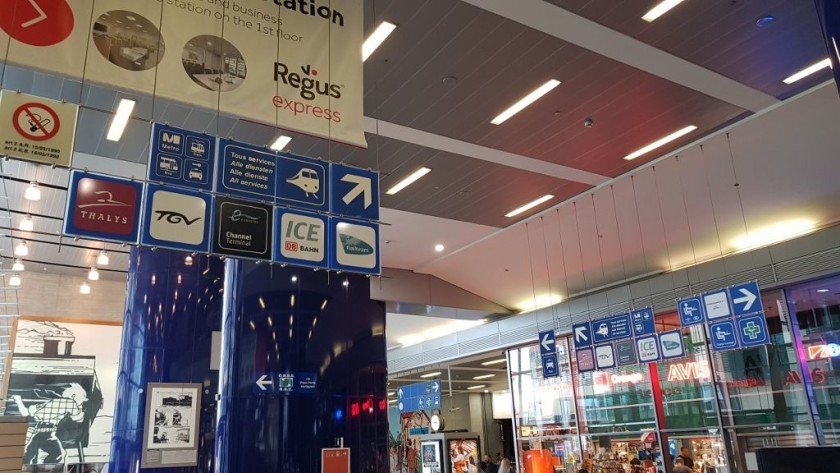
Brussels/Bruxelles is a gateway to a swathe of other destinations in northern Europe when travelling by train from London.
There are direct trains from Bruxelles to virtually all other major towns in cities in Belgium, as well as trains from Bruxelles to Austria, Luxembourg, Germany and The Netherlands; the latter provide useful connections if the timings of the timings of the direct trains from London don't suit.
What do I need to know about changing trains in Brussels?
These FIVE things in particular are worth being aware of:
(1) The Eurostar trains arrive at Bruxelles Midi station (French), which is also known as Brussel Zuid (Dutch).
Both French and Dutch, as well as English, is used on the signage and departure screens at the station.
Some place names are very different in the Dutch or French languages, but the different names are rotated on the departure screens - so don’t be alarmed if at first you can’t see your destination listed.
(2) Bruxelles-Midi isn't one of Europe's glamorous railway terminals, it's more of a functional commuter hub; though you shouldn't have long to linger between trains.
(3) If you will be taking a regular, non-high speed train service on from Bruxelles/Brussels, then the making the onward connection is fairly conventional.
You check the details of the next departure and make your way to the platform/track (voie) that it will be departing from.
Though that can be easier said than done; hence the additional info, which you can find HERE.
(4) However, connecting into another high speed train on from BruxellesMidi is slightly different.
The ICE trains on to Germany, the Eurostar (formerly Thalys) trains to Germany, Paris and The Netherlands (and the TGV services to other cities in France) all depart from a specific part of Bruxelles-Midi station.
However, this ‘international terminal’ isn’t particularly obvious, it’s merely a seating area to the right of SNCB international ticket office, which has red and purple tinted windows.
So once you have descended from the platform/track (voie) that the Eurostar will have arrived at, make your way to it; you’ll find it on the right hand side of the main passage beneath the tracks.
Confirm the details of your onward train on the TV style departure screens, which you’ll find in the international departure area - they’re easier to make sense of, than the main departure board of the station.
Another key difference with taking a high speed train on from Bruxelles-Midi, is the potential need to pass through security checks.
This may seem unnecessary when making a connection from a Eurostar, because you will have already passed through security in London, but the staff at Bruxelles-Midi won't know that.
(5) Be aware of your connecting time between trains.
Many end-to-end London to Germany train tickets sold by the ticket agents allow only around 20 mins to make the connection between trains at Bruxelles-Midi.
If you will making such a journey you need to head directly to your connecting train; don't pause to use the shops in the station etc.
More info is available on our guide.
Where can I travel to with ONE change of train in Brussels?
- Pretty much every other town and city in Belgium.
(Ypres/leper is one of the few exceptions, to reach Ypres from Bruxelles you need to make a second simple change of train at Kortrijk). - There are also direct trains from Bruxelles to Luxembourg's capital and the city of Arlon.
- The Dutch cities served by direct trains from Bruxelles/Brussels are - Amsterdam (all trains to Amsterdam also call at Schiphol airport), Breda (connect for Tilburg, 's-Hertogenbosch, Nijmegen and Arnhem) and Rotterdam.
- The German cities which can be reached on direct trains from Bruxelles/Brussels are - Aachen, Cologne/Koln, Dusseldorf, Essen, Bonn*, Dortmund and Frankfurt (Main), Koblenz* and Mainz* and now Berlin.
*= The Nightjet train heading to Wien conveys seats and it calls in these stations. - On Tuesday, Thursday and Saturday, there is also a Nightjet train to Linz and Wien / Vienna.
When travelling on to most other cities in Germany, including Hamburg and Hannover and München you need to make another change of train, usually in Cologne/Koln.
The trains to Frankfurt (Main) also call at Frankfurt Airport/Flughafen and some of them also call at Siegburg/Bonn station, which has public transport connections to Bonn city centre.
What about tickets for journeys which involve a change of train in Brussels?
These three things in particular are worth being aware of:
SMTJ's understanding is that;
- if a delayed Eurostar causes a missed connection in Bruxelles tickets can be transferred to the next departure, regardless of whether it is a Eurostar Thalys train or an ICE train;
- if a delayed Eurostar results in a missed connection into an ICE train and and overnight stay in Bruxelles is then required, the overnight accommodation costs won't be covered.
- if a delayed Eurostar in non-exceptional circumstance results in a missed connection into a Eurostar formerly Thalys train AND an overnight stay in Bruxelles is then required, there will be compensation for the cost of the overnight accommodation;
- if exceptional circumstances cause a missed connection into a Eurostar formerly Thalys train, the overnight accommodation costs won't be covered.
On to Bruxelles city centre
Bruxelles-Midi station is some distance from Bruxelles/Brussels city centre, but tickets for London to Bruxelles journeys by Eurostar can be used to travel on to other train stations in central Bruxelles.
They're not valid on the Bruxelles Metro, but the optimum connection on to many areas of the city centre is by the frequent main line trains - [Bruxelles Central station](/train-travel-info/countries/belgium/cities/bruxelles-brussels/rail-stations/bruxelles-central-brussel-centraal/ lives up to its name.
Travelling with a rail pass:
If you will be travelling with a valid Eurail or Interrail pass, you’ll have to pay the reservation fee to travel on the Eurostar, but the only trains on from Bruxelles on which rail pass users also HAVE to pay to reserve seats are the Eurostar (formerly Thalys) trains.
However, you can avoid these Thalys trains if you will be travelling on to The Netherlands by taking the EuroCity Direct.
If you will be travelling on to Germany you can avoid these fees on the Thalys trains by targeting the ICE trains.
Booking Tickets:
Ticket booking links and tips for how to buy them are including on our journey guides.
In summary - London to Brussels/Bruxelles train tickets are sold by:
Eurostar, B-Europe and NS International also sell tickets for train journeys between London and all major towns in Belgium.
Back to London:
Making onward connections in Lille:
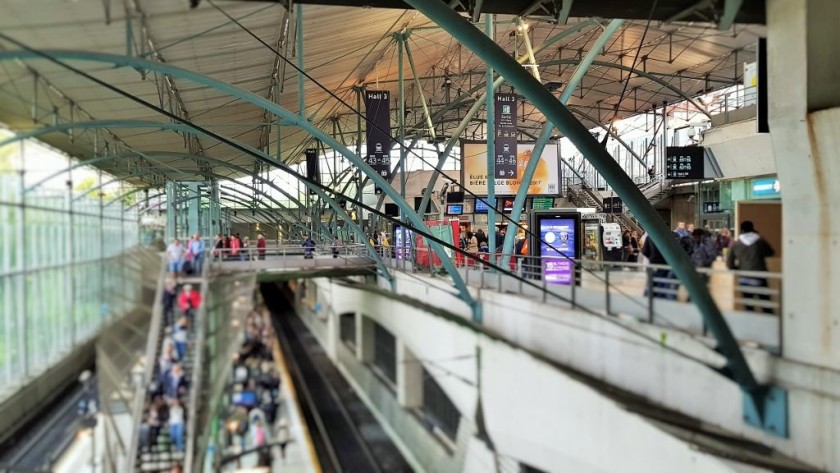
If you make connections between Eurostar and TGV trains at Lille-Europe station, you can avoid the need to make transfers in Paris from the Gare Du Nord to other stations in the city.
Where can I travel to from London with one change of train in Lille?
The principle towns and cities in France which can be reached by taking a Eurostar to Lille and a TGV train on from the city are:
Angers; Angouleme; Avignon; Bordeaux; Lyon; Marseille; Montpellier; Nantes; Nimes; Poitiers; Rennes; St Pierre des Corps (Tours); Strasbourg and Valence.
French towns and cities with either no direct trains from Lille, or no viable connections from a Eurostar include: Annecy; Antibes, Cannes Chambery; Grenoble; Nice; Reims and Toulouse.
Monday to Thursday:
|
Depart |
Arrive |
Depart |
Destination |
|---|---|---|---|
|
07:01 |
09:26 |
10:54 |
Montpellier |
|
|
|
11:29** |
Marseille* |
|
09:01 |
11:23 |
12:50** |
Marseille* |
|
11:04 |
13:26 |
13:52 |
Marseille |
|
|
|
13:52 |
Strasbourg |
|
|
|
15:15*** |
Montpellier |
|
|
|
15:19** |
Marseille* |
|
13:04 |
15:26 |
15:45 |
Nantes |
|
13:04 |
15:26 |
15:45 |
Nantes |
|
|
|
17:01 |
Montpellier |
|
|
|
17:15 |
Bordeaux |
|
15:04 |
17:25 |
17:38 |
Nantes and Rennes |
|
|
|
18:23 |
Marseille |
|
|
|
18:52 |
Lyon |
Fridays:
|
Depart |
Arrive |
Depart |
Destination |
|---|---|---|---|
|
07:01 |
09:26 |
10:54 |
Montpellier |
|
|
|
11:29** |
Marseille* |
|
09:01 |
11:23 |
12:50** |
Marseille* |
|
11:04 |
13:26 |
13:52 |
Marseille |
|
|
|
13:52 |
Strasbourg |
|
|
|
15:15 |
Montpellier |
|
|
|
15:19** |
Marseille* |
|
13:04 |
15:26 |
15:45 |
Nantes |
|
|
|
16:54 |
Marseille |
|
|
|
17:01 |
Perpignan |
|
|
|
17:15 |
Bordeaux |
|
15:04 |
17:25 |
17:38 |
Nantes and Rennes |
|
|
|
18:23 |
Marseille |
|
|
|
18:52 |
Lyon |
Saturdays:
|
Depart |
Arrive |
Depart |
Destination |
|---|---|---|---|
|
07:01 |
09:26 |
10:54 |
Montpellier |
|
|
|
11:29** |
Marseille* |
|
09:01 |
11:23 |
12:50** |
Marseille* |
|
11:04 |
13:26 |
13:52 |
Marseille |
|
|
|
13:52 |
Strasbourg |
|
12:04 |
14:26 |
15:19** |
Marseille* |
|
13:04 |
15:26 |
15:45 |
Nantes |
|
14:04 |
16:26 |
16:54 |
Marseille |
|
|
|
17:01 |
Perpignan |
|
|
|
17:15 |
Bordeaux |
|
15:04 |
17:25 |
17:38 |
Nantes and Rennes |
Sundays:
|
Depart |
Arrive |
Depart |
Destination |
|---|---|---|---|
|
09:01 |
11:23 |
12:50** |
Marseille* |
|
11:04 |
13:26 |
13:52 |
Marseille |
|
|
|
13:52 |
Strasbourg |
|
|
|
15:15 |
Montpellier |
|
|
|
15:19** |
Marseille* |
|
13:04 |
15:26 |
15:45 |
Nantes |
|
|
|
17:01 |
Montpellier |
|
|
|
17:15 |
Bordeaux |
|
15:04 |
17:25 |
17:38 |
Nantes and Rennes |
|
|
|
18:52 |
Lyon |
*= a low-cost, more basic Ouigo service departing from Lille Flandres station.
**= departs from Lille Flandres station.
***= Thursday only
Trains to Marseille also call at Lyon-Part-Dieu* and Avignon TGV.
Trains to Montpellier also call at Lyon-Part-Dieu, Valence TGV and Nimes.
Trains to Bordeaux also call at Poitiers.
Trains to Nantes also call at Le Mans and Angers.
Trains to Rennes also call at Le Mans.
*= the Ouigo services which depart at 11:29 and 15:19 call at Lyon-St Exupery.
As can be noted on these tables, most of the 'connections involve spending more than 90 mins in Lille between trains; and this can impact on the ticketing (see below).
What do I need to know about changing trains in Lille?
These are the THREE things that are particularly worth knowing when making connections in Lille:
(1) The Eurostars will arrive at Lille-Europe station and most of the TGV trains to other cities in France from Lille also depart from here
However, the departure details of the TGVs, such as which platform/track (voie) they will leaving from, aren't usually confirmed until around 20 mins before they are due to depart.
So on arriving at Lille, you will have to ascend up into the departure halls to wait for your onward connection.
(2) As can be seen above, what can be frustrating is that the connecting time between the arrivals of a Eurostar and the departures of the TGVs is usually very random.
So the potential time advantage of avoiding the need to transfer between stations in Paris, is usually negated by lengthy waits between trains in Lille.
How long you are prepared to wait between trains in Lille is of course a matter of personal preference, but spending up to two hours between trains in Lille station still makes for an easier journey, than crossing Paris by public transport.
(3) Many trains from Lille, including the trains to Bordeaux and the Ouigo trains, depart from a separate station, Lille Flandres
The relationship between the two main stations in Lille is a case of quite near, yet quite far.
Too near for public transport connections to be an obvious choice, though in bad weather making the one-stop-hop on the Lille Metro can be the best option - but far enough away for walking with luggage to be literally a bit of a drag.
What do I need to know about the train tickets if I'll be changing trains in Lille?
When looking up tickets for train journeys between London and cities in France, all of the agents that sell such tickets, combine journeys via Lille with the journeys via Paris, on their search results.
So the journeys with a change of train in Lille can require seeking out, though if you're heading to any of the destinations in France on the above tables, there should be at least one daily option via Lille, so keep looking.
Three things worth keeping in mind are:
(1) Travelling via Lille is usually more expensive than travelling via Paris, there are fewer trains on from Lille than on from Paris, so the cheapest tickets on the trains from Lille tend to sell out faster.
(2) As the journeys via Lille avoid the time required to transfer between stations in Paris, you might expect the end-to-end journeys via Lille to be typically faster than those via Paris, but they're not.
The connecting time between trains in Lille tends to be similar, or longer, to the time it takes to cross Paris on the metro or RER.
(3) The ticket agents rarely sell end-to-end journeys via Lille which involve waiting more than 1hr 30mins between trains.
However, as can be seen above there are often TGV trains on to other cities in France which depart more than 90 minutes after a Eurostar has arrived from London
If you would prefer to spend around two hours waiting in Lille-Europe station for a connecting train, rather than making a cross Paris transfer, then the only option can be booking two separate tickets.
One for the London to Lille journey and the other for the journey on from Lille - our journey guides point out when this is an option.
What if the Eurostar arrives too late to make a booked connection in Lille?
This is a very unlikely scenario, but if you have booked end-to-end tickets, your tickets should be re-issued free of charge for the next available train(s) on to your final destination.
However, if you have booked separate tickets for each train, you may need to buy replacement tickets in Lille and then claim a refund.
Though the only scenario in which you should be booking separate tickets, is if the connecting time between trains in Lille is more than 75mins - so it’s highly unlikely that you will find yourself in this situation.
Travelling on from Lille to nearby towns:
If you’ll be making a train journey from London to other towns in northern France such as Amiens, Arras or Douai, you’ll be connecting into a TER train, which will depart from Lille Flandres station.
You may as well as book the ticket for the onward journey by TER train, when you’re at the station in Lille, as you won’t save by booking the ticket for the TER train journey in advance online.
Making onward connections in Paris:
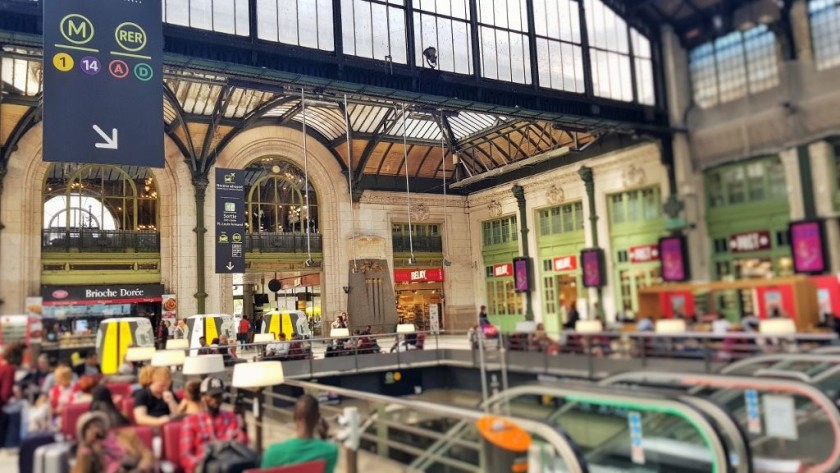
There is no main central station in Paris, the city centre is surrounding by seven terminus stations, each of which serves different destinations.
So when making train journeys from London to destinations to the east, south and west of the French capital, changing trains in Paris means changing stations too.
What destinations can be reached only by changing trains in Paris?
Travelling via Paris is the best option if you want to travel from the UK by train to Italy, Spain and Switzerland.
Destinations outside of France which have direct daytime trains from Paris include Barcelona; Basel; Figueres; Geneva; Girona; Lausanne; Milan; Stuttgart; Turin and Zurich.
Having to transfer between stations in Paris is also the best option for travelling between the UK and a swathe of French towns and cities by train.
Popular destinations which fall into this category include: Antibes, Besancon, Belfort, Biarritz, Brive, Cannes, Clermont-Ferrand, Colmar, Dijon, Hendaye for north-west Spain, La Rochelle, Nice, Orleans and Toulouse.
What do I need to know about changing trains in Paris?
The Eurostars arrive at the Gare Du Nord in Paris, but the only other long distance trains from this station are heading north, back towards Lille and Bruxelles.
Trains heading east, south and west from the French capital, depart from SIX other stations in Paris; Austerlitz, Bercy, Est, Lyon, Montparnasse and St Lazare.
(1) Austerlitz is the station that Intercités trains on to Toulouse via Limoges and Brive depart from, as well as trains to Orleans and Tours and the Intercités De Nuit trains to destinations in southern France.
It is directly linked from the Gare Du Nord by line 5 of the Paris Metro, take trains heading towards to ‘Place d’Italie’
Though the connection isn’t step free, you’ll have to heave luggage down two flights of stairs at Gare d’Austerlitz metro station.
It’s also a nine station journey, so allow 30 - 40 mins from stepping off of a Eurostar to departing by train from Austerlitz.
(2) Bercy is the station that the Intercités trains to Clermont Ferrand via Nevers and Vichy depart from.
The easiest public transport route from the Gare Du Nord to Bercy station is to take a RER Line D (Sud) train to the Gare De Lyon and connect there for a Line 14 Metro train (direction Olympiades).
Allow 45 mins to make this transfer between the two stations, though you may make it in around 30 mins if time is tight.
(3) Paris Est also known as Gare de l’Est, is unsurprisingly where trains to destinations to the east of the French capital depart from.
So you’ll need to make the somewhat awkward transfer between the Gare Du Nord and Gare De l’Est if you’ll be heading to Metz, Nancy, Reims and Strasbourg and other destinations in Alsace via Paris.
(If you’ll be travelling between the Britain and some cities to the east of Paris, including Frankfurt (Main) and Luxembourg then the easiest journey option is to travel via Bruxelles).
On a map the Est and Nord stations seem very close to each other, but that’s partially why for the time being, it’s an awkward transfer.
The 7 - 12 min walk between the stations is made complicated by a steep flight of stairs and it’s also not the smartest part of town.
Purchasing a Metro ticket for a one-station hop on Line 5, or resorting to a taxi for a 5 min ride can actually be options worth considering; our guide explains why.
(4) The Gare Du Nord is linked to the Gare De Lyon by the RER, the Parisian commuter trains which cross the city in tunnels.
The Gare De Lyon lives up to its name, as it is indeed the station in Paris that the TGVs to Lyon leave from; but it’s also the station where the TGVs to Burgundy, Franche Comté and other destinations in Rhone-Alpes depart from.
It is also the only Paris station used by trains to Barcelona, Languedoc, Provence, The Cote D’ Azur, The French Alps, Italy and Switzerland
From Gare Du Nord it’s a two station, 10 minute ride on any Line D (Sud) train, follow the signs in the RER station and make sure you’re NOT on a Line D (Nord) train or a Line B train.
We’ve produced a guide to making the transfer between the two stations, which you can find HERE.
The headline news that this transfer by RER isn’t as grim as it used to be, efforts have been made to brighten up the RER station at Gare Du Nord and there are also usually a lot more station staff visible.
Allow a minimum of 40 mins from a stepping off a train at Gare Du Nord to stepping on a train at Gare De Lyon; though if time is tight, it can be done in around 25 minutes.
(5) Trains from Paris to the west and south-west including Brittany, Bordeaux, La Rochelle, Nantes, Poitiers and Rennes, as well as the TGVs to Toulouse and the Spanish border at Hendaye, depart from Gare Montparnasse.
It seems to be a fairly straight-forward connection from the Gare Du Nord to Montparnasse as Line 4 of the Paris Metro provides a direct link.
However, we’re not going to gloss over the fact that it is in fact a comparatively awkward transfer, particularly if you’ll have luggage.
It’s an impossible transfer if you require step-free access; you can discover why on our guide.
But in summary the three things definitely worth knowing are:
- On arrival at Montparnasse – Bienvenüe metro station, you’ll need to negotiate three flights of stairs in order to exit from the the Metro.
- At Montparnasse it will typically take 10 mins from stepping off the Metro to being on the main concourse.
- The typical total transfer time, from stepping off the Eurostar at the Gare Du Nord to being on the concourse at Montparnasse will be 45- 50 minutes.
(6) Trains from Paris to destinations in Normandy including Bayeux, Caen, Cherbourg, Le Havre and Rouen depart from St-Lazare.
The transfer to St Lazare station from the Gare Du Nord should take 10 - 20 mins; the RER Line E station at Gare Du Nord is named Magenta.
Take RER Line E, there are trains every 5-10 mins to Haussmann – St-Lazare, which is also where the trains terminate.
There are short passage ways at both mainline stations connecting them to the RER Line E - but this is a comparatively straightforward station to station transfer.
Rouen is also served by trains from Lille, which avoid the need to make the transfer between the Gare Du Nord and St.Lazare, but to take these trains you will need to switch stations in Lille.
What do I need to know about train tickets if I’ll be making a connection in Paris?
These five GENERAL pieces of advice are worth keeping in mind when making a booking - they have to be general because each booking will also have specific terms and conditions.
(1) If you purchase a ticket for an end-to-end train journey which involves transferring between stations in Paris, it won’t include the Metro Or RER trains.
How to buy a ticket is included on the trains in Paris guide.
(2) Keep the connecting time between trains front of mind, the ticket agents won’t sell journeys with overly ambitious transfer times, but they inevitably always assume that the Eurostar will arrive in Paris on time.
(3) Journey options which allow around an hour to cross Paris from the Gare Du Nord, can become a race against the clock IF the Eurostar is 15 mins late.
In that scenario, move towards the front coaches of the train around 15-20 mins before the new arrival time at Gare Du Nord.
The exits on to the concourse at Gare Du Nord, from where you can access the Metro and RER, will be by the front of the Eurostar; and you’ll want to be by the doors when they open.
(4) If you’ve booked the cheapest, most heavily discounted, tickets for an end-to-end journey via Paris, they will be valid on the specific trains only; including the train on from Paris.
Though, if you miss a booked connection on from Paris due to the late arrival of a Eurostar, you should be able to either a book a new ticket free of charge, or claim a refund for any additional tickets you need to book.
That’s because both Eurostar and SNCF (French national railways) are members of the ‘Railteam Alliance’.
(5) However, if the Eurostar has arrived at the Gare Du Nord in good time* to make the transfer, but you miss the connection because;
- of a delay on the Metro or RER,
- your taxi or bus got stuck in traffic,
- you took the wrong Metro line…or any other circumstances not directly attributable to SNCF...
...then it's likely you will have to purchase new tickets for your onward connection, or pay a price difference with the more expensive ticket ; and any subsequent refund request may be refused.
*It can be a grey area, for example if the Eurostar arrived at the Gare Du Nord 30 mins late for a 90 min connection, but you subsequently missed your onward train because your taxi got stuck in traffic, the scenario is that you would have made the train if you'd taken the RER instead.
Hence a scenario best avoided, so if you want to purchase the cheapest possible tickets AND maximise your chances of a stress-free transfer, our advice is to allow two hours between the arrival of a Eurostar and a departure on from Paris.
Particularly if you’ll be making the connection into the final train of the day on from Paris.
If all goes well you can relax and have something to eat/drink** before your next train leaves, you might have traded the fastest possible journey, but it can be worth it!
**If you’ll be taking a train on from Montparnasse, the much better option is to seek out a bar/café near the station.
Booking Tickets:
Ticket booking links and tips for how to buy them are including on our journey guides.
In summary tickets for journeys from London to all major towns and cities in France are sold by
Back to London:
London to Czechia:
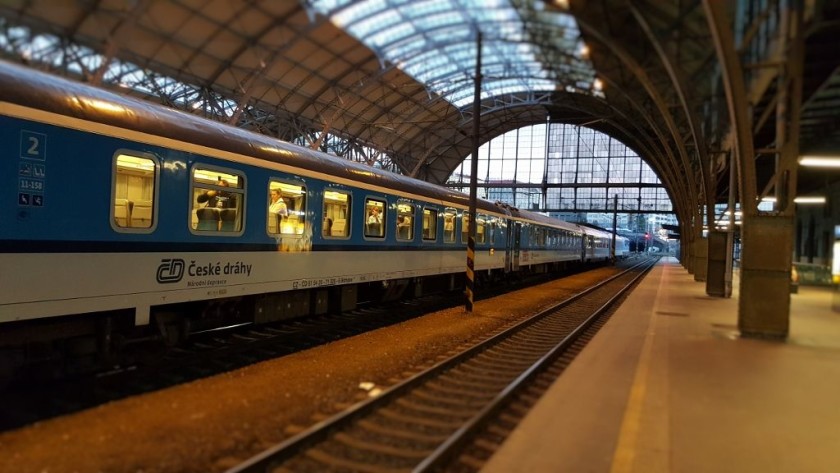
Prague/Praha has become a destination which has now become a lot easier to reach from London by train.
On Monday, Wednesday and Friday when departing London on the train which typically leaves St Pancras shortly after 15:00, will arrive in Bruxelles-Midi station around 1hr mins prior to the departure of an overnight train on to Decin and Praha/Prague.
If you will need to depart London on the other days of the day, the easiest routing is:
- Depart London on the Euostar to Paris Gare Du Nord which typically departs at 12:31.
- You'll then have around 90 minutes to the transfer from the Gare Du Nord to the Gare De L'Est.
- Taking the train which typically leaves Paris at 17:25 for Freiburg.
- You'll then have time for an early dinner in Freiburg before connecting into the new direct overnight train to Praha/Prague, which also calls in Decin, and will typically depart Freiburg at 21:58 and arrives into the Czech capital shortly after 09:30.
Or if you’re happy to stay overnight somewhere and split the journey into two days of travel, you can choose between these three options:
Option 1: spend the night in Frankfurt
Day One: London to Frankfurt via Bruxelles
Day Two: Frankfurt to Praha/Prague via Dresden; ICE train + a scenic journey with an easily timed connection.
Option 2: spend the night in Berlin
Day One: London to Berlin via Koln
Day Two: Berlin to Prag
Option 3:: spend the night by Bruxelles-Midi station
Day One: London to Bruxelles
Day Two: Bruxelles to Praha/Prague via Frankfurt (Main), Nurnberg and Cheb.
This option typically has the cheapest train fares as explained on Seat 61.
London to Denmark:
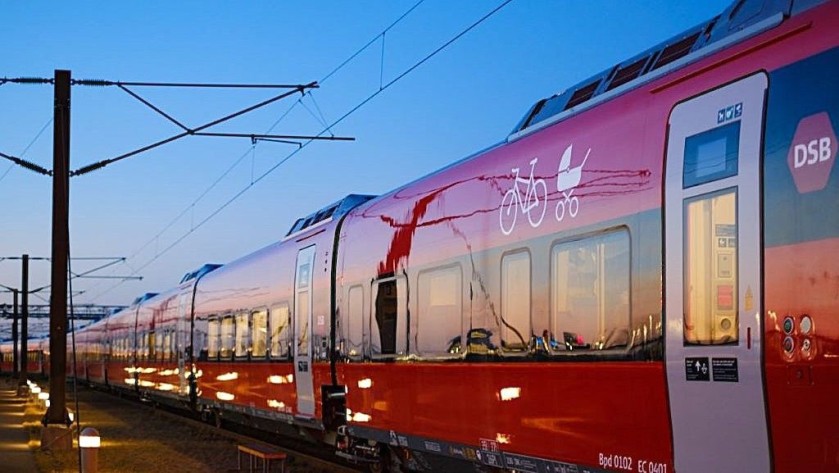
The days when you could take a boat train, a ferry across the North Sea and then a train from Holland all the way to Denmark are long gone; though on balance we'd probably prefer today's options, particularly when travelling overnight.
How can I make a daytime journey by train from London to Denmark?
The options for making a journey by day from London to Kobenhavn / Copenhagen vary according until the dates of travel.
From March 28th 2026 there will be typically be an evening departure scheduled to travel on from Hamburg Hbf to the Danish capital shortly after 18:50; it will be scheduled to arrive in Kobenhavn H station after 23:30.
On Monday to Friday only there will usually be a Eurostar available that will leave London shortly after 07:00am.
With connections in both Bruxelles-Midi and Koln Hbf, the usual arrival time in Hamburg will be 17:15 or 18:15.
Note that it isn't possible to complete the journey in a single day on a Saturday or Sunday.
How do I make an overnight journey by train from London to Denmark?
The Berlin Night Express, which is operated by Snälltåget, conveys couchettes and seats on from Hamburg Hbf to Kobenhavn Syd station - the line M4 of the Copenhagen Metro provides an easy transfer on to the city centre.
Though it only operates during certain periods of time, for its dates of operation check out its website.
When it is an option, it typically departs from Hamburg Hbf shortly before midnight and arrives in Kobenhavn / Copenhagen a little after 06:00am
Froom May 1st if you'll be happy to travel on from Hamburg in a seat, a Comfort Jet train will usually be departing Hamburg Hbf shortly after 22:45, with an arrival into the Danish capital's main rail station a little before 06:00am.
No matter which of these two options you'll want to take on from Hamburg, you can connect into them by taking the Eurostar which typically departs London shortly after 11:00am.
Though the arrival into Hamburg shortly after 21:30 depends on making a 20 min connection between trains in Bruxelles.
However, if need be the subsequent departures on from Bruxelles and Koln are scheduled to arrive in Hamburg at around 22::15
Alternatively Cologne is the logical option for an overnight stay when taking a train from London to Hamburg, as it’s located at the approximate half way point of a London to Copenhagen journey and there's a comparatively wide choice of places to stay near to Koln Hbf station.
So take trains from London to Koln/Cologne and then on the next day travel on from Koln/Cologne to Copenhagen/Kobenhavn.
Another option which can often be found online involves travelling from London to Denmark by train via The Netherlands.
It involves a detour off the shortest route as the crow flies, but it's viable, because on day one you can take a direct Eurostar from London to Amsterdam; and then on day two travel from Amsterdam to Kobenhavn/Copenhagen by train is usually straightforward.
Or travel during the day from London to Hamburg via Rotterdam or Amsterdam, then spend the night in Germany before travelling on to Denmark on day two.
London to Germany:
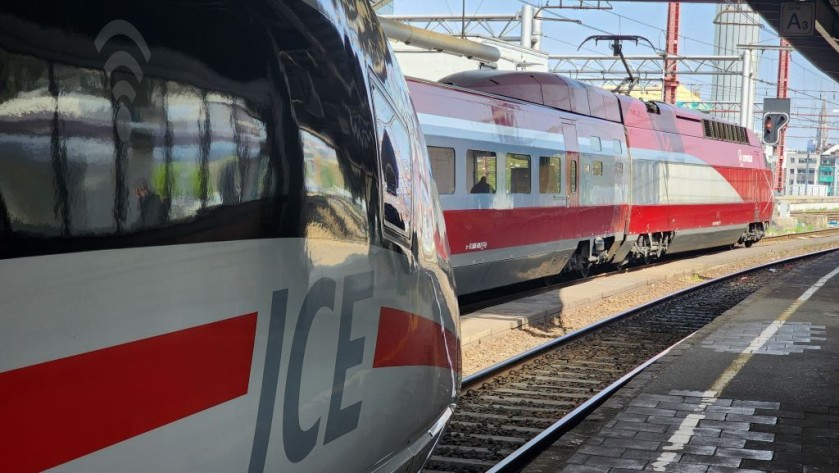
Depending on the location of your final destination, you'll be travelling by train from London to Germany via Bruxelles or Paris.
The plus of travelling via Bruxelles is that the train on to Germany will be departing from the same station which the Eurostar will have arrived at.
A potential negative is that the daytime connections between trains in Brussels are usually, comparatively tightly timed - perfect if the Eurostar isn't delayed, but not so great if it is.
In contrast, the positive of traveling via Paris is that it's less likely that you'll be rushing to change trains, but the negative is that the need to make a transfer between stations.
Where can I travel to in Germany from London with only one change of train?
The only destinations in Germany that can be accessed from London by DAY, with one theoretically simple connection AND no need to transfer between stations - are Aachen, Dortmund, Dusseldorf, Dusiburg, Essen, Koln/Cologne, Frankfurt (Main) and Siegburg/Bonn and now overnight to Berlin.
Both the ICE and Eurostar (formerly Thalys) trains services on from Bruxelles serve Aachen and Koln/Cologne.
The ICE trains serve Frankfurt (Main) and Siegburg/Bonn, while the Eurostar (formerly Thalys) trains provides the only direct trains between Bruxelles and Dortmund, Dusseldorf, Duisburg and Essen.
What do I need to be aware of when making connections in Bruxelles on London to Germany daytime train journeys?
When looking up a London > Germany train journey by day via Bruxelles, the combination of Eurostar + ICE trains will be faster and it's often cheaper.
However, the timetable usually only allows for around 20 mins for the majority of connections in Bruxelles-Midi station, between the arrival of a Eurostar train and the departure of the ICE train on to Germany.
So it's ideal if the Eurostar from London happens to arrive exactly on time in Bruxelles, but delays can mean a race against the clock, or broken connections.
In the event of a missed connection, tickets/reservations will be re-issued free of charge, but it’s not an ideal scenario.
Though on a Monday to Friday the first Eurostar of the day has an 80 min connection into an onward ICE train.
Where can I travel to if I change trains in both Bruxelles and Koln/Cologne?
If your final destination is another city in northern Germany, including Bremen, Hannover and Hamburg and Hannover, the easiest end-to-end journey option involves making connections in both Bruxelles and Koln.
Where can I travel to if I change trains in Paris?
If you’re heading to destinations in Germany to the south of Koln/Cologne during the day by train, then a viable alternative to making connections in Bruxelles is to travel by train via Paris.
You’ll need to make the comparatively short transfer between Paris Nord and Paris Est stations, but there are direct trains from Paris Est to Augsburg, Frankfurt (Main), Karlsruhe, Mannheim, Munchen/Munich, Saarbrucken, Stuttgart and Ulm.
A plus of travelling via Paris is that the connections there are aren’t so tightly timed as those in Bruxelles.
Where can I travel in Germany to if I change trains in both Bruxelles and Frankfurt (Main)?
When travelling between London and other destinations in eastern and southern Germany including Dresden, Leipzig, Nuremberg and Wurzburg by train, the easiest option is usually
(1) a Eurostar from St Pancras to Bruxelles-Midi
(2) an ICE train from Bruxelles-Midi to Frankfurt (Main) hbf.
(3) another ICE train on from Frankfurt (Main) hbf to Dresden, Leipzig, Nuremberg and Wurzburg
Frankfurt (Main) Hbf is an exceptionally easy large station in which to make connections, particularly if you will be travelling with luggage.
Booking Tickets:
Ticket booking links and tips for how to buy them are including on our journey guides.
In summary, tickets for train journeys from London to ALL major towns and cities in Germany are sold by -
TRAINLINE will sell tickets for journeys via Brussels or Paris.
Both of these two agents which sell tickets for journeys to most major cities in Germany, but only when travelling via Brussels.
B-Europe is particularly useful for looking up London to Aachen or Cologne journeys, as it enables easy comparison of the journey options which involve taking an ICE or a Thalys train on from Bruxelles/Brussels.
Back to London:
London to The Netherlands:
Amsterdam and Rotterdam are now served by direct Eurostar trains from London, which means it is now easier than ever before to travel from London to any destination in the Netherlands by train.
Both Amsterdam and Rotterdam are connected by frequent and efficient trains to other Dutch cities, but depending on your final destination, the better option is to change trains in one city and not the other.
Sometimes this choice between Amsterdam, or Rotterdam isn't particularly obvious, hence we have split the options on the questions below.
Where can I travel to in The Netherlands from London with change of train in Rotterdam?
The Eurostar trains from London to Amsterdam aren’t non-stop, they also call in Rotterdam and if you’re heading from Britain to many Dutch cities, changing trains in Rotterdam is often the best option.
A swathe of Dutch destinations can be reached in under 40 mins by train from Rotterdam, including Amersfoort, Delft, Den Haag/The Hague, Dordrecht, Eindhoven Gouda, Leiden and Utrecht.
Connect in Utrecht for more distant cities including Groningen, Leeuwarden and Zwolle.
So if they’re your final destinations, connecting in Rotterdam is a better option than travelling via Amsterdam.
Where can I travel to by train in The Netherlands from London by making one change of train in Amsterdam?
As will be seen above the easiest option when travelling from London to many Dutch cities by train is to change trains in Rotterdam and not Amsterdam.
However, some cities in The Netherlands that don’t have direct trains from Rotterdam do have direct trains from Amsterdam.
These cities include Arnhem, ‘Den Bosch’, Deventer and Nijmegen, so when travelling to them by train from London, going via Amsterdam is the best option.
Changing trains in Amsterdam is also an easy option when heading from London to destinations in north-west Holland by train, including Alkmaar, Haarlem, Hoorn, Den Helder and Enkhuizen.
Booking Tickets:
Ticket booking links and tips for how to buy them are including on our journey guides.
In summary tickets for journeys from London to Amsterdam and Rotterdam on the direct trains are sold by
If you will be buying tickets for journeys to other destinations in The Netherlands, book them on NS International.
NS is the national rail operator in The Netherlands, so this website has the widest choice of journeys/tickets at the cheapest possible price.
Back to London:
London to Poland:
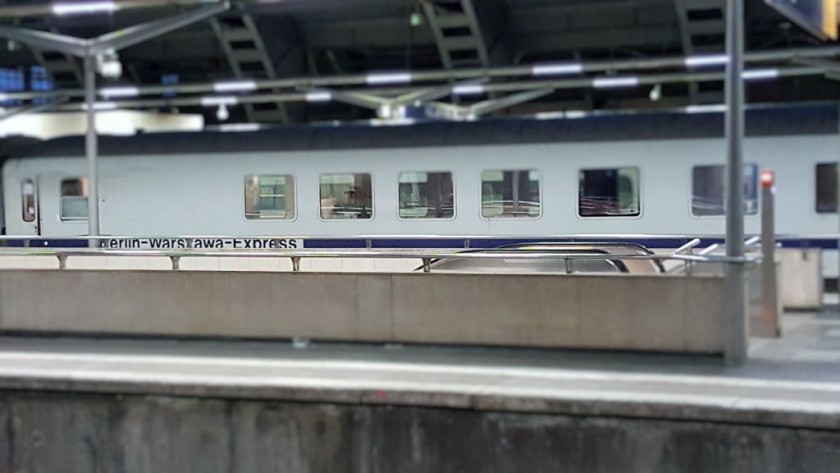
Travelling by train from London to Poland has never been straightforward and if those night trains, which met ferries from England, ever did convey coaches to Poland, they are now distant memories.
How can I travel by train from London to Warsaw/Warszawa?
It is now theoretically possible on Monday to Fridays to travel from London to Warsaw/Warszawa in a single day by train, hence tickets for the end-to-end journey typically being available to book on RailEurope.
- The first stage of routing is to take the Eurostar which is usually scheduled to depart from London at 06:16 on Mondays to Fridays only.
- There will be a connecting ICE train on to Koln Hbf departing within 20 minutes - though if need be you can take the subsequent ICE train; and the connections will arrive in Berlin around 45 mins before departure of the final train of the day on to Warszawa.
- A 30 min connection in Koln will enable an arrival into Berlin around 1hr 40 mins prior to the departure of the Warszawa train.
The alternative, which is the only option at weekends, is to split the journey and overnight in Koln/Cologne - there's a comparatively wide choice of places to stay near to Koln Hbf station.
So take trains from London to Koln/Cologne and then on the next day travel on from Koln/Cologne to Warsaw.
There are daily connections on from Koln/Cologne to Warszawa which involve departing from Koln hbf at 07:48; 08:48 or 12:48 and making connections in Berlin Hbf.
The trains from Berlin on to Warszawa also usually stop in Poznan.
London to Spain
The options for taking the train from London to Spain have been reduced in recent years, due to the withdrawals of the overnight trains between Paris and both Barcelona and Madrid.
Though this is partially as a result of the daytime train journey from London to Spain being faster than ever before - and despite the distance, it's no more complicated to reach Barcelona by train from London than many cities in France.
How do I travel by train from London to Barcelona?
Only one daily option is available and it involves:
- departing from St Pancras station on the Eurostar which typically leaves at 09:31;
- on arrival at the Gare Du Nord, close to two hours should be available* to make the transfer over to the Gare De Lyon;
- Departing from the Gare De Lyon on the train which typically leaves at 14:42 and arrives in Barcelona at 21:32.
How do I travel overnight to Barcelona?
There are typically two options for making this journey in 2026:
1: via Cerbere on Friday
On the dates when it is an option it will be possible to:
- departing from St Pancras station on the Eurostar which typically leaves after 14:30
- on arrival at the Gare Du Nord, around two hours should be available to make the transfer over to the Gare d'Austerlitz.
- The Intecités De Nuit train, which provides travel in couchettes or reclining seats, usually departs for Cerbere shortly after 20:00.
- The usual scheduled arrival time in Cerbere, the final station before the Spanish border, is 09:16.
- If the train arrives on time, there is a train over the border to Port Bou in Spain at 09:29, which has a 40mins (ish) connection into a train that is typically due to arrive in Barcelona shortly after 12:30.
- Though if the connection is missed, there is usually a departure at 13:30, which with the connection in Port Bou, arrives in Barcelona at 15:10 - tickets will be valid on this later alternative
1: via Cerbere on Sunday
On the dates when it is an option it will be possible to:
- departing from St Pancras station on the Eurostar which typically leaves after 14:30
- on arrival at the Gare Du Nord, around two hours should be available to make the transfer over to the Gare d'Austerlitz.
- The Intecités De Nuit train, which provides travel in couchettes or reclining seats, usually departs for Cerbere shortly after 20:00.
- The usual scheduled arrival time in Cerbere, the final station before the Spanish border, is 09:16.
- There is typically a train over the border to Port Bou in Spain at 10:22, which has a 40mins (ish) connection into a train that is typically due to arrive in Barcelona at 13:40
3: via La Tour de Carol on Friday and Saturday
On the dates when it is an option it will be possible to:
- departing from St Pancras station on the Eurostar which typically leaves after 16:30
- on arrival at the Gare Du Nord, around two hours should be available to make the transfer over to the Gare d'Austerlitz.
- The Intecités De Nuit train, which provides travel in couchettes or reclining seats, usually departs for La Tour De Carol shortly before 22:15 - and the final 45mins of the journey is a stunner
- Though only 25 mins after its scheduled arrival at 10:00, a regional train will head off on the beautiful journey to Barcelona Sants station, where it is typically due to shortly before 14:00; But if the connection is missed due to a not atypical late arrival of the train from Paris, the next departure on from La Tour De Carol isn't until 13:00!
How do I travel by train from London to destinations in northern Spain during the day?
If you’re heading to northern Spain, then it’s possible to travel to cities including Burgos, Bilbao, Irun and San Sebastian and Valladolid in a day by train from London; you will be making the journey on Monday to Saturday.
The routing is:
(1a) On Monday to Friday take the 07:01 Eurostar from London to the Gare Du Nord in Paris - arriving at 10:19.
(1a) On Saturday take the 07:31 Eurostar from London to the Gare Du Nord in Paris - arriving at 10:48.
(2) Make the transfer in Paris from the Gare Du Nord to the Gare Montparnasse.
(3) Take the TGV train which USUALLY departs from the Gare Montparnasse at 12:06 to Hendaye.
If you’re heading to San Sebastian the easiest option is to leave the train from Paris at Hendaye and connect there into the local Euskotren service to San Sebastian/Donastia ; you should be in the centre of San Sebastian around 45 mins after you have stepped off the train in Hendaye.
If you want to head to Bilbao then the only option is to also take this Euskotren service to San Sebastian/Donastia and then connect there for another Euskotren service on to Bilbao; though be aware that you’ll be travelling for more than three hours on what are the equivalent of Metro trains.
Booking Tickets:
Tickets for train journeys from London to most destinations in Spain are sold by TRAINLINE
If you can't find the destination you will be travelling to, it's likely that you will have to book separate tickets for the London to Barcelona or Irun journeys and then for your journeys within Spain.
Back to London:
Other sources of information:
(1) We have summarised much of the info our London to Europe by train guide, but if you want or need the full details, look no further than Seat 61.
(2) If you will taking multiple trips around Europe by train then the European Rail Timetable can be a big help with planning your routes and weighing up the journey options.
(3) If you're not a detail person and just need quick access to departure and journey times on your phone, then download the DB Navigator app.
Please support ShowMeTheJourney
This second version of ShowMeTheJourney is exciting and new, so we are genuinely thrilled that you are here and reading this, but we also need your help.
We’re striving not to let anything get in the way of providing the most useful service possible, hence a facility has been set up with DonorBox which can be used to support the running costs and make improvements.
Instead of advertising or paywalls, your financial support will make a positive difference to delivering an enhanced service, as there’s a lot of ideas which we want to make happen.
So if you have found the info provided here to be useful, please go here to say thank you.

Simon Harper
I wanted to share my passion for train travel and explain how anyone can take the fantastic journeys I have taken.

This is one of more than 100 train travel guides available on ShowMeTheJourney, which will make it easier to take the train journeys you want or need to make. As always, all images were captured on trips taken by ShowMeTheJourney.
This second version of ShowMeTheJourney is exciting and new, so we are genuinely thrilled that you are here and reading this, but we also need your help.
We’re striving not to let anything get in the way of providing the most useful service possible, hence a facility has been set up with DonorBox which can be used to support the running costs and make improvements.
Instead of advertising or paywalls, your financial support will make a positive difference to delivering an enhanced service, as there’s a lot of ideas which we want to make happen.
So if you have found the info provided here to be useful, please consider saying thank you.






